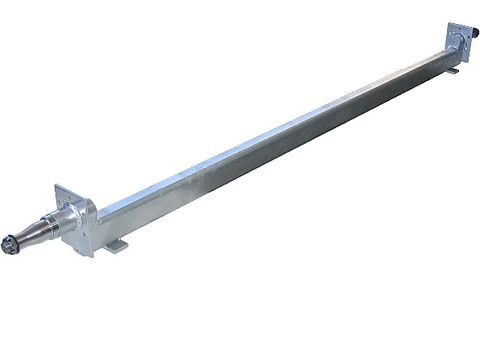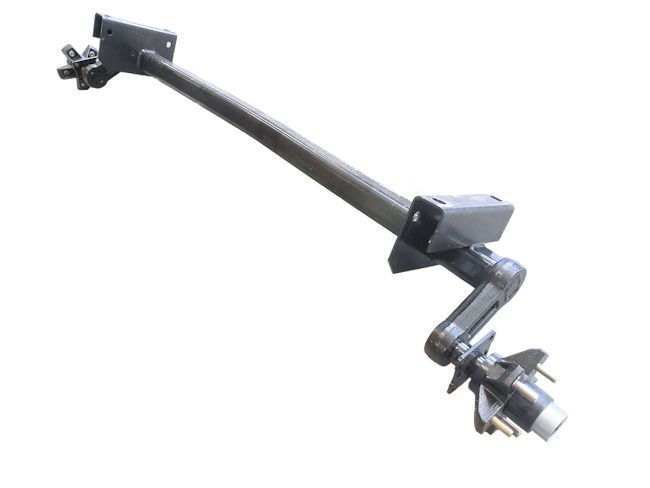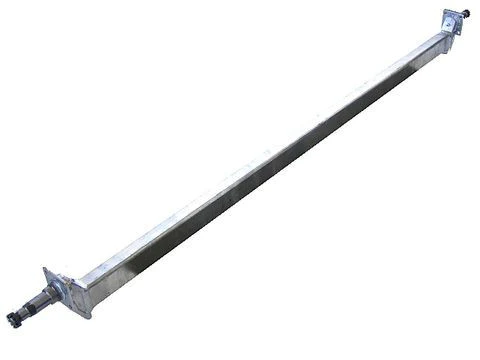Product Description
Product Parameters
14T Germany trailer axle sales to Iraq
Jin Xihu (West Lake) Dis. semitrailer axle produced by the company, has reasonable structure, good braking quality, high-intensity, big rigidity, long life, as well as strong bearing capacity, and also passed the national authoritative department’s monitor: The fatigue life reaches 1.5 million times without damage, which surpasses national standard. At present, the annul productive ability of Jin Xihu (West Lake) Dis. semitrailer axle has surpassed 10 thousands, widespread using in domestic and overseas, and selling in distant markets in Malaysia, Germany, US, Ecuador and so on.
Products features:
1.Special heat-treat,low alloy steel axle beam,it has the vitues of good synthetic
performance,strong loadabilityand lower self weight;
2.High quality alloy solid iserted spindle,through wholy heat treatment,provide
superior fatigue capacity;
3.High performance premium non-asbstos brake linings,extend service life;
4.Easy for ABSinstallation;
5.Camshaft,maching with special seals,can ensure no entry of the grease into the brake
drum,more safety;
6.New tight fit hub cap have O rings,high property for sealing;
7.Grease lubricant is supplied by Mobil that lengthens the time of free maintenance;
8.Full range of stud fixing such as ISO,BSF,and JAP,it can meet the requirements of various wheel rims.
We have 7 types of axles
- American type axles (Inboard type and outboard type )
- Germany type axles ( Wheel type and spider type )
- English type axles ( 8 holes, 10 holes / ISO BSF JAP )
- Lowbed axles / concave axles
- Agricultural axles ( With brake, Without brake, Stub axles )
- Steering axles
| Type | Germany Type Trailer Axle |
| Process | Casting |
| Material | Steel |
| Capacity | 12T 14T 16T |
| Track length | 1840mm, 1850mm, 2040mm, 2050mm, as your requirement |
| Axle beam | Round type and square type, 127mm/150mm |
| Package | 1.use plastic film winding wheel hub 2.use metal plate fasten between axles 3.axles accessories in the wooden box or carbon boxes Or according to customers’ requests |
| Delivery | Two weeks after confirm the order |
| MOQ | 1 Piece |
| Payment | L/C or 30% T/T prepaid, the balance against the copy of B/L |
| Certification | ISO9001. TS16948 |
| Product& Package | Customization |
| Trial order or Sample | Acception |
| Axle type | Brake size | Wheel fixing | NO.size of wheel stud | Wheel REG.DIA.(DIM B) | DIM D | Bearing | Min wheel size | Beam size | Axle capacity | Spring seat installation | Weight |
| RND1218I | 420×180 | ISO | 10xM22x335 | 281 | 711.5 | 33213 33118 | 8.0-20 | ◊150 | 12t | ≤450 | 370kg |
| RN1218J | 420×180 | JAP | 8xM20x285 | 221 | 711.5 | 33213 33118 | 8.0-20 | ◊150 | 12t | ≤450 | 370kg |
| RND12220I | 420×200 | ISO | 10xM22x335 | 281 | 721.5 | 33213 33118 | 8.0-20 | ◊150 | 12t | ≤450 | 397kg |
| RND1222I | 420×220 | ISO | 10xM22x335 | 281 | 721.5 | 33213 33118 | 8.0-20 | ◊150 | 12t | ≤450 | 410kg |
FAQ
Q1:Are you a factory?
A:Yes,we are a factory,but not just a factory,as we have sales team,our own offices,and they
all can help the buyers and cooperative partners to decide which products are the best choices
for them,and all your requirements and inquires will be replyed in time.
Q2:What’s your Delivery Time?
A:In general, the delivery time is 15-20 days.We will make the delivery as soon as possible with
the guaranted quality.
Q3:What is the convenient way to pay?
A:L/C , T/T,Unionpay,DP are accepted,and if you have a better idea , please be free sharing with us.
Q4:Which type of shipping would be better?
A:Generally,in consideration of the cheap and safe superiorities of sea transportation,we advice
to make delivery by sea.What’s more, we respect your views of other transportation as well.
Product Description
/* January 22, 2571 19:08:37 */!function(){function s(e,r){var a,o={};try{e&&e.split(“,”).forEach(function(e,t){e&&(a=e.match(/(.*?):(.*)$/))&&1
| After-sales Service: | 1year |
|---|---|
| Condition: | New |
| Axle Number: | 1 |
| Customization: |
Available
| Customized Request |
|---|
.shipping-cost-tm .tm-status-off{background: none;padding:0;color: #1470cc}
|
Shipping Cost:
Estimated freight per unit. |
about shipping cost and estimated delivery time. |
|---|
| Payment Method: |
|
|---|---|
|
Initial Payment Full Payment |
| Currency: | US$ |
|---|
| Return&refunds: | You can apply for a refund up to 30 days after receipt of the products. |
|---|

What are the legal regulations or guidelines regarding trailer axle weight limits?
Trailer axle weight limits are subject to legal regulations that vary by region and are designed to ensure road safety and preserve infrastructure. Here are some common guidelines:
- Maximum Weight Limits: Most regions specify the maximum allowable weight on a single axle, tandem axles, or multi-axle configurations.
- Gross Vehicle Weight Rating (GVWR): Trailers are assigned a GVWR, indicating the maximum weight they can legally carry, including cargo and the trailer’s own weight.
- Per-Axle Weight Limits: Legal limits restrict the weight any single axle or axle group can carry. These limits can vary by axle spacing.
- Weight Distribution: Regulations often require proper weight distribution between axles to prevent overloading a particular axle.
- Permits for Oversized Loads: Transporting loads exceeding standard weight limits may require special permits and adherence to specific regulations.
- Axle Spacings: Legal restrictions may govern the distance between axles or axle groups, affecting weight distribution.
- Tire Load Ratings: Trailer tires must meet or exceed the expected load, and tire ratings impact weight limits.
- State and Local Regulations: In the United States, weight limits can vary by state and locality, so it’s important to be aware of and comply with local laws.
It’s crucial for trailer owners and operators to understand and adhere to these regulations to ensure safe and legal operation. Non-compliance can result in fines, road safety hazards, and damage to roads and bridges.

What is the impact of trailer axle alignment on tire wear and performance?
Proper trailer axle alignment is crucial for tire wear and overall performance. Misaligned axles can lead to a range of issues:
1. Uneven Tire Wear:
– Axle misalignment can cause tires to wear unevenly. For example, excessive toe-in or toe-out (the angle of the tires relative to the trailer’s centerline) can lead to premature wear on the inner or outer edges of the tires. This not only reduces tire lifespan but also affects handling and safety.
2. Reduced Fuel Efficiency:
– Misaligned axles increase rolling resistance, which requires more energy to move the trailer. As a result, fuel efficiency can decrease, leading to higher operating costs.
3. Handling and Stability Issues:
– Axle misalignment can result in poor handling and reduced stability. Trailers may become more difficult to control, especially during braking and cornering, posing safety risks.
4. Overloading and Weight Distribution Problems:
– Misalignment can affect weight distribution. It may cause excessive weight on one axle, leading to overloading and potential legal issues. Balanced weight distribution is vital for safe and legal towing.
5. Axle Stress and Damage:
– Misalignment places additional stress on axles and suspension components. Over time, this stress can lead to component damage, potentially causing breakdowns and expensive repairs.
6. Trailer Drift:
– Misalignment can cause the trailer to drift or pull to one side, making it challenging to maintain a straight course, especially when driving at highway speeds.
7. Reduced Tire Lifespan:
– The combination of uneven tire wear, increased rolling resistance, and handling issues can significantly reduce the lifespan of trailer tires. This results in more frequent and costly tire replacements.
8. Safety Concerns:
– A misaligned trailer is less stable and more difficult to control, increasing the risk of accidents and compromising safety.
Alignment Solutions:
– To address axle misalignment, it’s essential to have the trailer inspected by a qualified technician. They can adjust the alignment by modifying the axle’s position and orientation. Precision alignment equipment is often used to ensure accuracy.
– Regular alignment checks and adjustments, as part of routine maintenance, can help prevent these issues and promote even tire wear and better performance.
– Properly aligned axles improve handling, safety, and tire longevity, making it a critical aspect of trailer maintenance.

Are there different weight capacities for trailer axles depending on the trailer type?
Yes, trailer axles come in various weight capacities, and the capacity depends on the specific trailer type and its intended use. Here are some common weight capacities for different trailer types:
1. Utility Trailers:
– Utility trailers often have single axles with weight capacities ranging from 1,000 to 3,500 pounds. These trailers are used for light-duty hauling and general-purpose applications.
2. Boat Trailers:
– Boat trailers can vary widely in weight capacity based on the size of the boat they are designed to carry. Smaller boat trailers may have weight capacities of 3,000 to 5,000 pounds, while larger ones can exceed 10,000 pounds.
3. Enclosed Trailers:
– Enclosed trailers, used for transporting cargo, merchandise, or personal items, can have weight capacities from 2,000 to 12,000 pounds or more, depending on their size and construction.
4. Flatbed Trailers:
– Flatbed trailers are available in various weight capacities to accommodate different cargo loads. Common capacities include 7,000, 10,000, and 14,000 pounds, among others.
5. Dump Trailers:
– Dump trailers, designed for hauling materials like gravel or construction debris, may have weight capacities ranging from 5,000 to 20,000 pounds, or even higher for heavy-duty models.
6. Car Hauler Trailers:
– Car hauler trailers, used to transport vehicles, typically have weight capacities of 7,000 to 14,000 pounds, depending on the number of axles and the size of the trailer.
7. Gooseneck Trailers:
– Gooseneck trailers are heavy-duty and often used for transporting large equipment or livestock. Their weight capacities can range from 10,000 to 30,000 pounds or more.
8. Specialty Trailers:
– Specialty trailers, such as equipment trailers, horse trailers, and concession trailers, have weight capacities tailored to their specific purposes and design.
– It’s crucial to select a trailer with an axle and weight capacity that matches the intended load. Overloading a trailer can lead to safety risks, damage to the trailer, and legal issues. Manufacturers provide weight ratings and guidelines for each trailer type to help buyers choose the right option for their needs.


editor by CX 2024-05-10